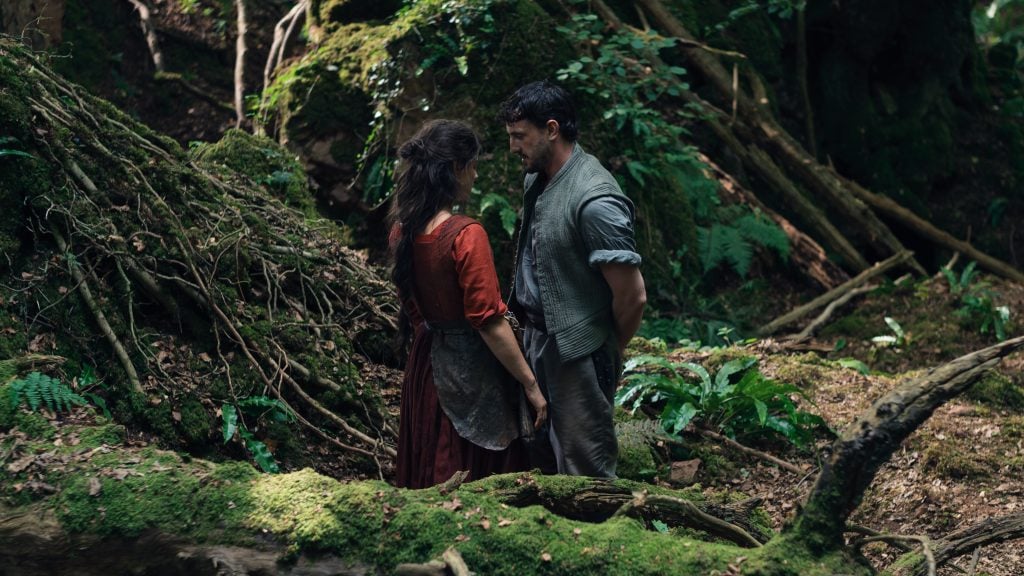They say that inspiration can come from anywhere. However, that feels a bit too simple for one of the greatest purveyors of the written word.
No, for William Shakespeare, whose plays and poetry have endured for centuries, surely there must be a larger force at work. Can the man who gave us Romeo and Juliet, Much Ado About Nothing, and The Tempest truly have been inspired by a blade of grass or the sun cracking through the clouds?
Hamnet, the new film by Chloé Zhao, adapted from Maggie O’Farrell’s historical fiction novel of the same name, posits a greater, more soul-stirring seed of inspiration. Hamnet follows William Shakespeare (Paul Mescal) as he falls in love and starts a family with Agnes Hathaway (Jessie Buckley), the eldest daughter of a prominent family. Agnes’s opacity and deep connection to nature draw William in, who feels out of place in his own family. The family grows quickly alongside William’s blossoming writing career in London, with them rearing Susanna (Bodhi Rae Breathnach) and twins Hamnet (Jacobi Jupe) and Judith (Olivia Lynes). Tragically, the spread of bubonic plague throughout England shatters the Shakespeare family’s joyous life, killing their only son. Agnes and William are devastated by the loss, and he processes Hamnet’s death and the subsequent distance from his wife by staging what many consider his greatest work, Hamlet.
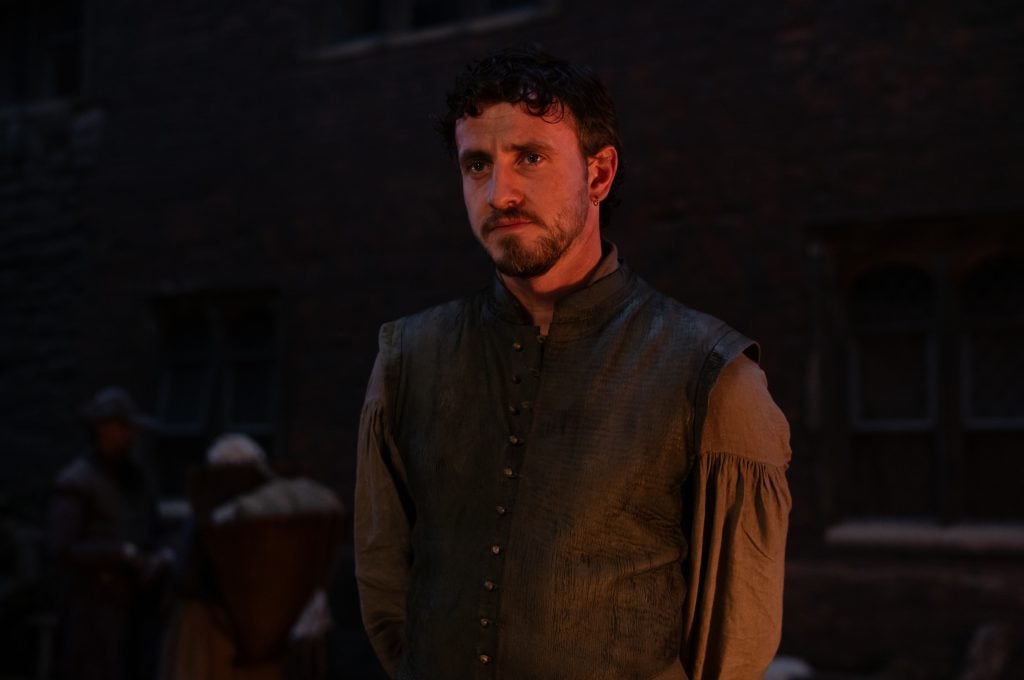
Features release.
Credit: Agata Grzybowska / © 2025 FOCUS FEATURES LLC
Grief is a powerful motivator for all things, including art, which may also make it unremarkable for someone as revered as William Shakespeare. Zhao seems to understand that wrinkle, which is why she broadens the scope to explore grief not just on a social plane, but on a metaphysical one. She does this by exploring Agnes’s potent connection to nature, evoking an old-world mysticism. Zhao often frames Agnes within the woods near her village, like when she opens the film with her curled up beneath a tree. Cinematographer Łukasz Żal plays with these scenes’ colors, enhancing the bold red of her dress with the foliage’s varied shades of greens and browns. Agnes is frequently a brash flash of color in a film awash in muted, almost monochromatic tones. Even William, with his frustrated vibrance, wears rustic, flattened blue shirts.
It makes sense, then, that Agnes would enthrall William, not just as the human manifestation of nature’s mystique but as an unknowable enigma in her own right. Zhao extracts so much joy from their courtship’s playful teasing and their mutual feeling of being truly seen that, by the time we see their candlelit wedding, we’ve already surrendered to the tears. The deep intensity between the couple helps them weather a series of devastating trials. William suffers mightily with depression-driven writer’s block, leaving him both distant and volatile. Paul Mescal’s strengths have resided in similar narrative spaces, and he conveys William’s despair and self-loathing brilliantly, most notably when William drunkenly struggles to write in the dead of night. At the center of Zhao’s still, sedated camera, Mescal’s body vibrates as if he’d rather shred his skin apart than cause Agnes any harm.
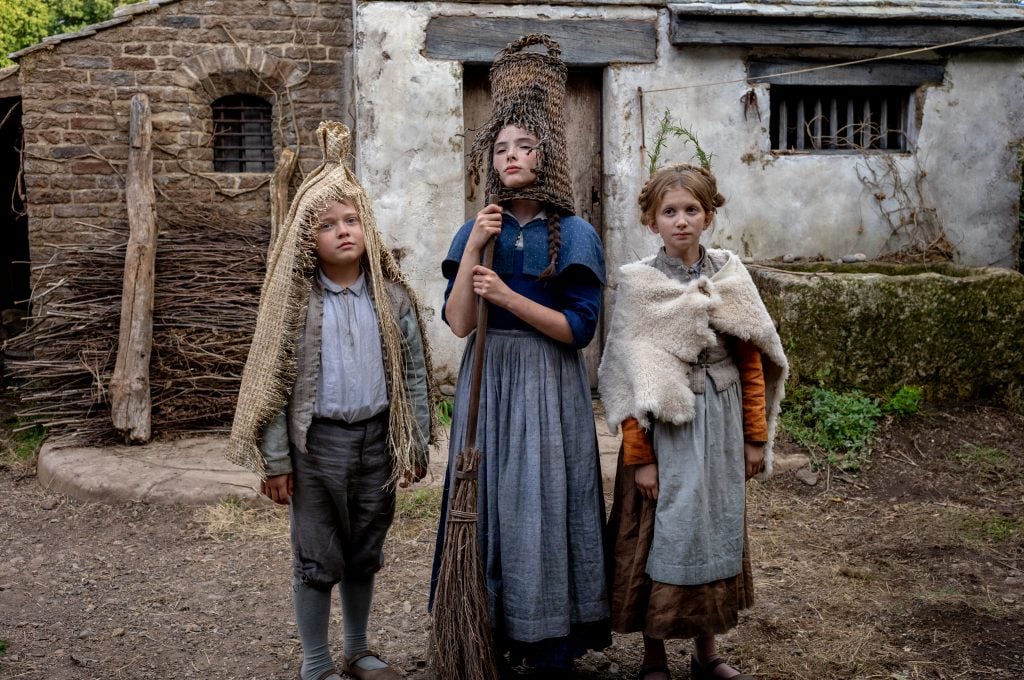
Judith in director Chloé Zhao’s HAMNET, a Focus Features release.
Credit: Agata Grzybowska / © 2025 FOCUS FEATURES LLC
Agnes, meanwhile, struggles with her increasingly tenuous link to the natural world that she spent her life revering. William’s absence, as he begins his writing career in London, leaves Agnes vulnerable to clashes with her mother-in-law, Mary (played with exacting rigor by Emily Watson). One clash occurs while Mary gives birth to twins, away from the comfort of the forest where Susanna was born. Again, Zhao blurs the tangible and intangible worlds and centers Agnes in the tempest they create together, leaving her whimpering and then wailing for her long-dead mother as she becomes one for the second and third times. The scene is one of immeasurable ache, with Jessie Buckley teetering on the edge between childhood and womanhood, but never falling too far to one side. Her outstanding control amidst the physical and emotional storm is what yields a fresh round of tears.
Somehow, the pain gets worse. The Shakespeare family’s tragedy is an amalgamation of their struggles, shaped into Hamnet’s death by the bubonic plague, played with remarkable, soulful emotional clarity by Jacobi Jupe. Hamnet fulfills his promise to his father to “be brave” by sacrificing himself for his ill sister. Agnes laments her frayed connection to nature, which led her to misinterpret which of her children needed protection. She also resents William’s time in London, which is tangled up in her doubts about whether she did all she could. William’s absence feels like a consequence of his fears of being a “dangerous, violent man,” which only compounds his guilt. The spiraling nightmare of Hamnet’s final moments would always be devastating. What sends it into soul-razing territory is how Zhao gently links the family’s smaller issues to this one moment, while zooming in and holding still to capture the agony without flourish.
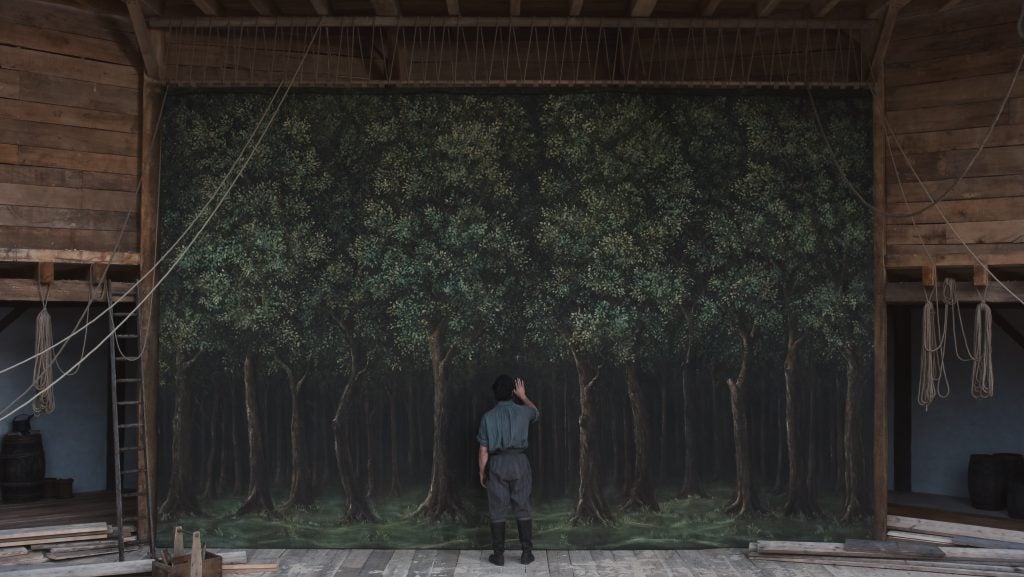
Features release.
Credit: Courtesy of Focus Features / © 2025 FOCUS FEATURES LLC
After such a shattering, gruesome loss, how does a family, let alone one person, move on? William tries by way of The Tragedy of Hamlet, which he stages in isolation from his bruised family. Zhao envisions the creation of “to be or not to be” monologue as William’s lowest point, her camera above and behind him as he stares into the water’s abyss, darkness enveloping him. He survives that contemplation and introduces the play to the world and Agnes. A torrent of emotions plays out across her face: confusion, anger, amusement, excitement, empathy, and catharsis. They are messy in their contradictions and complements, much like grief itself. It’s how William can sob in heartbreak and freedom as his masterpiece monologue plays to an enraptured crowd.
As for Agnes, William’s work cracks a withdrawn Agnes open, allowing her to extend a hand of grace to the man playing the imagined version of her son. That grace washes over the whole audience, the actor playing Hamlet, William backstage, and everyone watching on whatever screen. It’s a jaw-droppingly human experience, not quite healing, but something more: a step towards the future. What Buckley conveys through her eyes and face will tear your heart to pieces, but will also give you the glue to repair it. It is her greatest work, and possibly one of the year’s best acting sequences.
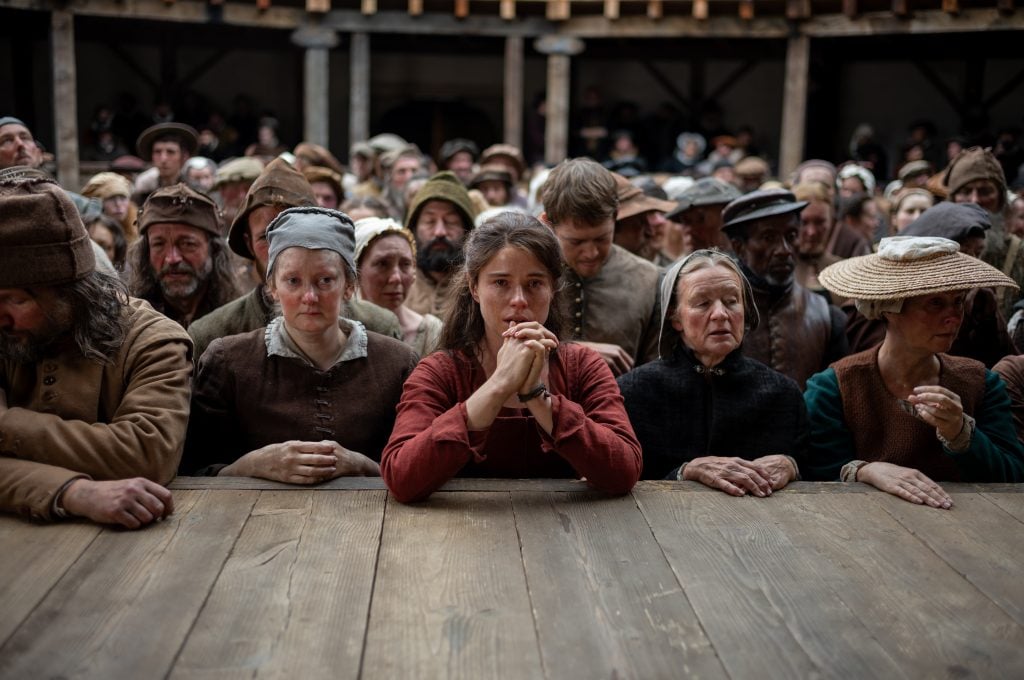
HAMNET, a Focus Features release.
Credit: Agata Grzybowska / © 2025 FOCUS FEATURES LLC
Hamnet’s answer to grief isn’t so much about moving on as channeling it into something we can collectively feel. These fictional interpretations of William and Agnes Shakespeare will always feel Hamnet’s tragic loss, but Hamlet, while not an exact adaptation, will ensure that his spirit will live on. The film operates in that same vein. While none of us will likely lose a loved one to the bubonic plague or create art that will last for centuries, Zhao binds us so intimately to her alchemic, magical manifestation of their world that we can’t help but be changed by it. Her film is an overwhelming achievement of pain and grace, a devastating but exalted work of transformative cinema.
Hamnet held its Canadian Premiere as part of the Gala Presentations section at the 2025 Toronto International Film Festival. The film will begin its theatrical rollout on November 27, 2025, courtesy of Focus Features.
Director: Chloé Zhao
Screenwriters: Chloé Zhao, Maggie O’Farrell
Rated: NR
Runtime: 125m
![HAMNET - Official Teaser Trailer [HD] - Only in Theaters Thanksgiving](https://geekvibesnation.com/wp-content/cache/flying-press/7ab9c60393566ca322ead216195f1f24.jpg)
Zhao binds us so intimately to her alchemic, magical manifestation of their world that we can’t help but be changed by it. Her film is an overwhelming achievement of pain and grace, a devastating but exalted work of transformative cinema.
-
GVN Rating 10
-
User Ratings (0 Votes)
0
A late-stage millennial lover of most things related to pop culture. Becomes irrationally irritated by Oscar predictions that don’t come true.


